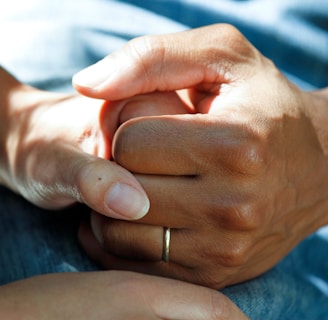The Emotional Cost of Not Being Prepared for Death
Aditi
4 min read


Grief Is Hard Enough on Its Own
Grieving is a full-body, full-heart experience. When someone we love dies, our entire world can tilt. We may struggle to sleep, eat, or think clearly. Our sense of safety can be shaken. Even if the death was expected, the depth of loss can still feel surprising.
Now imagine facing that emotional storm while also having to:
Arrange a funeral with no idea what the person would have wanted
Search for important documents across desk drawers and devices
Make medical or legal decisions on their behalf without guidance
Deal with family members who all have different opinions
Suddenly, grief is not the only thing to carry. There’s pressure, responsibility, and often, conflict, all of which can leave people feeling like they’re drowning, with no time or space to process their loss.
The Emotional Burdens People Don’t Talk About
Let’s take a closer look at the emotional toll that often goes unseen or unspoken when someone dies without a plan in place.
1. Guilt
When decisions need to be made on someone’s behalf, about their body, their belongings, their care, people often wrestle with guilt. Did I do what they would have wanted? Did I make the right choices? Should I have known more? Guilt thrives in uncertainty, and when nothing is written down, loved ones are left making educated guesses during one of the most vulnerable times in their lives.
2. Resentment
If the load of planning falls on one person, perhaps the eldest child, the spouse, or the “organised one” in the family, they may quickly become overwhelmed. When siblings, friends, or relatives don’t step in equally, resentment can fester, particularly if there were strained relationships to begin with.
3. Conflict
Disagreements over funeral choices, medical decisions, money, or heirlooms can split families apart. When there are no clear wishes to refer to, it becomes easy for past wounds to resurface. The death becomes not just a moment of loss, but a catalyst for lifelong fractures.
4. Anxiety
When someone dies without a will or clear instructions, their loved ones are often thrown into the unfamiliar territory of legal jargon, financial processes, probate, banks, and superannuation claims. The sense of urgency, combined with unfamiliarity, can create intense anxiety and decision fatigue.
5. Isolation
Those who take on the role of planning and managing everything often report feeling deeply alone. While others are grieving, they are busy handling logistics. People may praise them for being “strong,” but inside, they may feel anything but.
Real Stories, Real Emotions
Here are just a few examples of what can happen when someone dies without a plan:
A daughter arranges a cremation, only to later discover her father wanted to be buried next to his parents. The guilt stays with her for years.
A son is forced to guess at medical decisions during his mother’s final hours, while other family members argue over what “she would have wanted.” The stress and second-guessing affect his mental health long after her death.
A spouse discovers accounts in her partner’s name are frozen, with no access to funds, no knowledge of passwords, and no power of attorney. Instead of grieving, she is consumed by financial fear and chaos.
These are not isolated cases. They happen every day. And they are almost always preventable.
Emotional Fallout
We often hear that “grief is just love with nowhere to go.” But when grief is complicated by avoidable stress, it can morph into something heavier: prolonged grief, unresolved anger, and broken relationships. It affects not just the person directly involved, but everyone around them.
The emotional toll of not planning ahead ripples into:
Mental health: - People may experience anxiety, depression, burnout, or even PTSD symptoms.
Physical health - The stress can manifest in headaches, illness, insomnia, and fatigue.
Relationships - Conflicts over unspoken wishes can permanently damage families and friendships.
Long-term memory of the person who died - The final chapter of someone’s life can overshadow everything that came before it, if that chapter is marked by chaos or pain.
When someone says, “I wish I’d known what they wanted,” that’s not just a practical wish; it’s a cry for emotional closure that may never fully come.
Planning Isn’t Just a Practical Act - It’s an Emotional One
End-of-life planning isn’t only about ticking boxes or filling in forms. At its heart, it’s about love. It’s about sparing those we care about from unnecessary pain. It’s about creating clarity, direction, and a sense of calm at a time when everything else feels uncertain.
Here’s what changes when a plan is in place:
Decisions are made ahead of time, reducing stress and conflict
Family members feel guided, not burdened
There’s more room for presence, connection, and farewells
Grief can unfold without being interrupted by logistics or legalities
Planning also gives you a voice. It ensures your values, beliefs, and wishes are honoured, even when you can’t speak for yourself.
How to Begin Easing the Emotional Load
You don’t have to have all the answers now, and you don’t have to do it alone. But even one small step can start to shift the weight. Here are some ways to start:
1. Start Talking
Conversations about death can be difficult, but they don’t have to be morbid. Ask your partner what they’d want if they became seriously ill. Share your thoughts. Talk about what matters most at the end of life.
2. Write Down What You Can
Even a handwritten note about your preferences is better than silence. What kind of care would you want if you couldn’t make decisions? Who should be your voice? What type of farewell would feel meaningful?
3. Create a Safe Place for Key Documents
Gather what you can - your will, enduring power of attorney, passwords, and funeral preferences, and keep them in one place. Let someone you trust know where to find them.
4. Seek Compassionate Support
You don’t have to figure it out alone. Whether it’s a death literacy guide, end-of-life consultant, or supportive professional, getting help can lift the weight and provide direction in a calm, human-centred way.
Let Love Lead the Way
Planning for death may seem like a task for the head, but it’s really a task for the heart. It’s an act of love. An act of responsibility. An act of deep care.
By planning, you’re saying (through actions), "I want to protect you from pain I can prevent. I want to honour our relationship. I want to leave more love, not more questions."
When we make peace with death as a part of life, we give ourselves and those we love the chance to move through it with clarity, presence, and grace.
